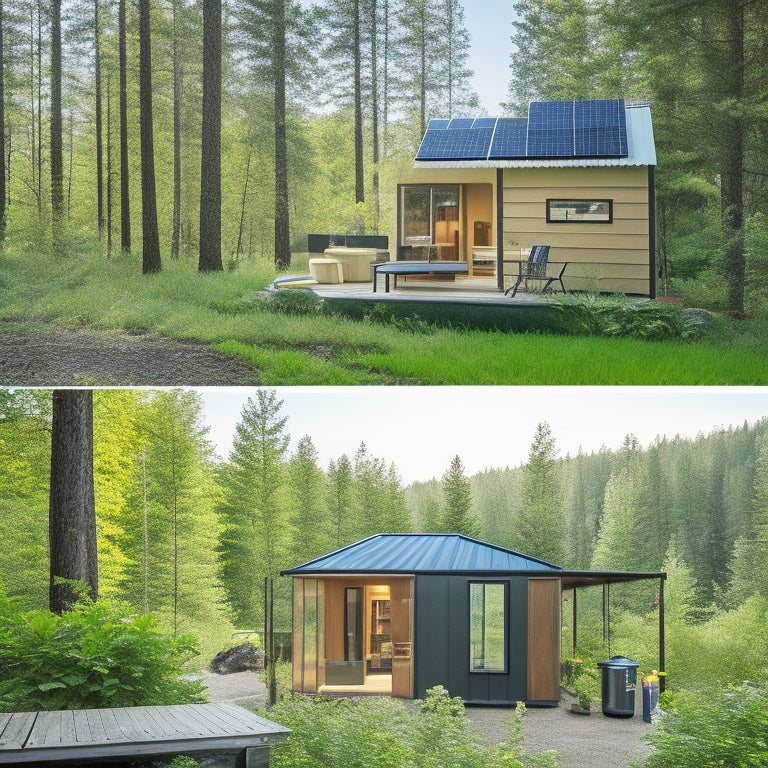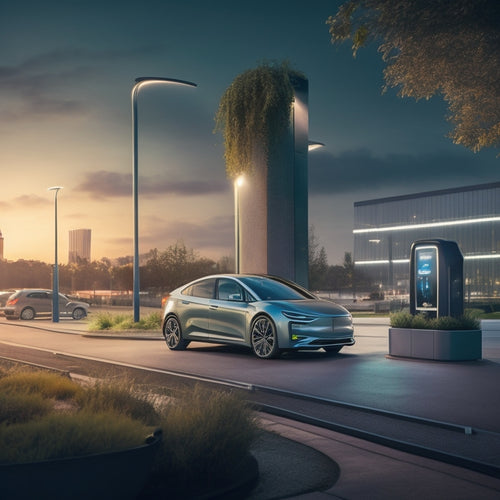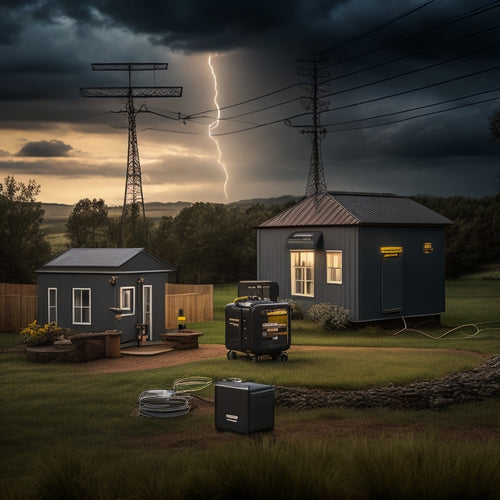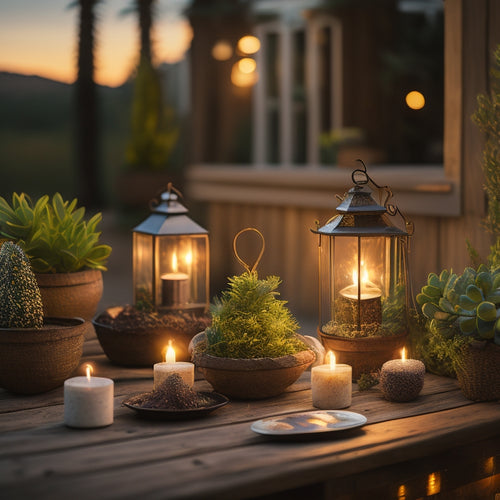
10 Best Home Appliances for Off-Grid Living
Share
You're about to initiate an off-grid journey, and selecting the right appliances is vital to maintaining a comfortable and sustainable lifestyle. You'll want to reflect on solar-powered refrigeration options, energy-efficient water pumps, and off-grid washing machines that conserve energy and water. Portable solar ovens for cooking, low-voltage lighting essentials, and eco-friendly dishwashers will also become your new necessities. Compact solar-powered freezers, energy-harvesting water purifiers, and off-grid air conditioning alternatives will complete your setup. Whether you're homesteading or cabin-living, these appliances will help you thrive off the grid - and there's more to uncover about how to make the most of them.
Key Takeaways
- Solar-powered refrigeration options with high-density insulation and advanced compressor technology ensure food safety and freshness in off-grid homes.
- Portable solar ovens and compact solar-powered freezers provide sustainable cooking and food storage solutions for off-grid living.
- Energy-efficient water pumps with low power consumption and alternative power sources like solar or wind energy reduce reliance on traditional energy.
- Low-voltage lighting essentials like solar lanterns and LED bulbs with smart switches offer reliable and adjustable ambient lighting for off-grid homes.
- Energy-harvesting water purifiers with UV light purification methods and rainwater harvesting technologies provide clean drinking water and reduce reliance on traditional energy sources.
Solar-Powered Refrigeration Options
Your off-grid home's most critical component might be its refrigeration system, as it directly impacts your food's safety and freshness.
You'll want to choose a solar-powered refrigeration option that's reliable and efficient. To guarantee a consistent power supply, proper sizing of solar panel systems, charge controllers, and inverters is critical Understanding Off-Grid Energy Needs.
Consider investing in high-quality solar fridge models designed specifically for off-grid living. These models are built to work seamlessly with energy storage systems, guaranteeing your food stays cool even during periods of low sunlight.
When selecting a solar fridge, look for features like high-density insulation, advanced compressor technology, and adjustable temperature controls.
Energy-Efficient Water Pumps
When it comes to energy-efficient water pumps for your off-grid home, you'll want to take into account three key factors: pump power options, water flow rates, and energy consumption.
You'll need to choose a pump that can handle your specific water needs, whether that's a low-power DC pump or a more durable AC pump. Additionally, it's crucial to investigate alternative power sources such as solar power to reduce your reliance on traditional energy sources.
By prioritizing easy maintenance features and implementing water conservation practices, you can optimize your pump's efficiency and reduce waste.
Pump Power Options
With a reliable source of water and an efficient pump power system, you can tap into the freedom and independence that off-grid living has to offer.
When it comes to pump power options, you have several choices. Wind turbine pumps are a great option, utilizing the power of wind to pump water from your well or storage tank. They're a cost-effective and eco-friendly solution, especially in areas with consistent wind patterns.
Hand operated pumps are another option, providing a manual way to pump water when electricity or wind power isn't available. These pumps are often used as a backup or in remote areas where access to electricity is limited.
Water Flow Rates
Selecting an energy-efficient water pump for your off-grid home relies heavily on understanding water flow rates.
You'll need to determine how much water your household requires daily, considering factors like the number of people, appliances, and fixtures.
Gravity-fed systems are ideal for off-grid living, as they conserve energy and reduce water waste.
Look for pumps with adjustable flow rates to optimize water conservation.
Consider your water source, pipe size, and elevation changes to calculate the required flow rate.
A pump that can handle your peak demand will guarantee consistent water pressure throughout your home.
Energy Consumption
You're likely wondering how to minimize the energy consumption of your water pump, as it's a crucial aspect of maintaining an off-grid lifestyle.
The key is to choose an energy-efficient water pump that's designed for off-grid systems. Look for pumps with high efficiency motors and low power consumption.
Additionally, consider investing in energy storage solutions, such as batteries or solar panels, to reduce your reliance on grid power.
To optimize your energy usage, install energy monitoring systems to track your pump's energy consumption and identify areas for improvement.
Off-Grid Washing Machine Solutions
Most off-grid homes rely on alternative energy sources, making it vital to choose a washing machine that can efficiently operate within these limitations.
You'll want to take into account manual washing techniques, such as a hand-crank or pedal-powered washer, which eliminate the need for electricity altogether.
Additionally, it's important to assess energy needs and select appliances that align with your off-grid energy system's capacity. Alternatively, look for energy-efficient machines with low power consumption.
Don't forget to pair your off-grid washing machine with effective laundry drying solutions, like a clothesline or drying rack, to reduce your energy usage further.
Portable Solar Ovens for Cooking
Your off-grid kitchen arsenal isn't complete without a portable solar oven, which harnesses the sun's energy to cook your meals.
This eco-friendly appliance is perfect for off-grid living, allowing you to cook a variety of dishes using solar cooking techniques.
One of the biggest portable oven benefits is its ability to retain heat, ensuring your food is cooked evenly and efficiently.
Plus, it's a great way to reduce your carbon footprint and save energy.
With a portable solar oven, you can cook anything from soups to casseroles, and even bake bread.
Its portability makes it ideal for camping trips or outdoor gatherings, and it's a must-have for any off-grid homestead.
Low-Voltage Lighting Essentials
As you venture into off-grid living, reliable lighting becomes vital for safety and comfort, especially after sunset.
You'll want to focus on low-voltage lighting essentials that work seamlessly with your energy management system. Solar lanterns and LED bulbs are great options, as they're energy-efficient and can be powered by your battery systems.
Consider investing in smart switches for lighting control, allowing you to adjust ambient lighting levels to your liking.
Outdoor lighting is also essential, so don't forget to include pathway lights and spotlights in your setup.
Solar-Powered Ventilation Systems
Through careful planning, you can make use of the power of solar energy to create a reliable ventilation system that keeps your off-grid home fresh and healthy.
By capturing the sun's energy, you can power fans and vents that provide consistent airflow, reducing the risk of mold and mildew growth.
Solar ventilation benefits include reduced energy costs and a lower carbon footprint.
Additionally, solar-powered ventilation systems offer sustainable airflow solutions that are ideal for off-grid living.
With a well-designed system, you can enjoy a comfortable and healthy indoor environment, even in remote locations.
Eco-Friendly Dishwashers for Off-Grid
Take the hassle out of doing dishes off the grid by switching to an eco-friendly dishwasher that's designed for remote living.
These dishwashers are specifically built to conserve energy and water, making them perfect for off-grid homes.
When shopping for an eco-friendly dishwasher, look for features like:
- Energy recovery systems that reuse heat from the wash cycle to pre-heat water
- Compatibility with biodegradable detergents that are gentle on the environment
- Low water consumption rates to minimize your impact on natural resources
- Quiet operation that won't disrupt your peaceful off-grid lifestyle
Compact Solar-Powered Freezers
Storing perishable food items off the grid can be a challenge, but compact solar-powered freezers offer a reliable solution. You can store your food at the right temperature without worrying about power outages or energy bills.
These freezers are designed to work efficiently with compact energy storage systems, ensuring you have a steady supply of power. The sustainable insulation used in these freezers helps maintain a consistent temperature, keeping your food fresh for longer.
With a compact solar-powered freezer, you can enjoy fresh fruits, vegetables, and meat even when living off the grid. They're perfect for small households or cabins, and some models can even be powered by a single solar panel.
Energy-Harvesting Water Purifiers
You're likely aware that access to clean drinking water is a top priority when living off the grid.
That's why energy-capturing water purifiers are a significant innovation, offering solutions like solar powered filtration systems, UV light purification methods, and rainwater collection technologies to guarantee a steady supply of potable water.
Solar Powered Filtration Systems
With access to clean drinking water becoming increasingly uncertain, solar powered filtration systems have emerged as a guiding light of hope for off-grid dwellers, providing a reliable means of purifying water without reliance on traditional energy sources.
You can utilize the power of the sun to purify rainwater, stream water, or well water, making it safe for consumption.
Here are some benefits of solar powered filtration systems:
- They're energy-independent, so you don't need to worry about fuel or electricity costs.
- Solar purification systems are low-maintenance and can last for years with minimal upkeep.
- They're a cost-effective solution for off-grid water purification, especially in the long run.
- Solar powered filtration systems are environmentally friendly, producing no emissions or waste.
UV Light Purification Methods
Many off-grid dwellers are turning to UV light purification methods, a reliable and efficient way to purify water using energy-harvesting water purifiers.
You can utilize the power of UV sterilization techniques to kill bacteria, viruses, and other microorganisms in your water supply.
Portable UV purifiers are a great option for off-grid living, as they're compact, lightweight, and easy to use.
Simply place the purifier in a container, add water, and let the UV light do its job.
These purifiers are often powered by rechargeable batteries or solar panels, making them a sustainable choice for off-grid living.
With UV light purification methods, you can have access to clean drinking water whenever and wherever you need it.
Rainwater Harvesting Technologies
Beyond relying on UV light purification, off-grid dwellers can also investigate rainwater harvesting technologies that employ energy-harvesting water purifiers.
These systems collect and treat rainwater, providing a reliable source of clean water for your off-grid home.
You'll want to reflect on the following:
-
Rainwater collection techniques: Design your roof and gutters to maximize water collection and minimize debris.
-
Greywater recycling systems: Reuse water from sinks, showers, and washing machines for irrigation and flushing toilets.
-
Energy-harvesting water purifiers: Use solar or wind power to purify rainwater, making it safe for drinking and household use.
- Water storage and filtration: Store rainwater in tanks and use filters or purifiers to remove contaminants and sediment.
Off-Grid Air Conditioning Alternatives
Five common misconceptions about off-grid living are that it's always hot, always dark, and always uncomfortable. But you know better. You're designing your off-grid home with comfort in mind.
When it comes to beating the heat, you're not limited to traditional air conditioning. Off-grid air conditioning alternatives are all about utilizing natural cooling methods. You can use passive cooling techniques, such as strategic window placement, insulation, and shading to keep your home cool.
Thermal mass materials like concrete or adobe can also absorb heat during the day and release it at night. By incorporating these methods into your design, you'll stay comfortable while keeping your energy consumption low.
Frequently Asked Questions
Can I Use Off-Grid Appliances in a Small Urban Home or Apartment?
You can definitely use off-grid appliances in a small urban home or apartment, as they prioritize energy efficiency and space optimization, making them perfect for compact city living, allowing you to reduce your carbon footprint and save on utility bills.
How Do I Maintain and Repair Off-Grid Appliances on My Own?
You're not a superhero, but you'll feel like one mastering DIY maintenance tips and troubleshooting techniques for off-grid appliances! Start by consulting user manuals, then YouTube tutorials, and finally, online forums for expert advice to tackle common issues and save a fortune on repair costs.
Are Off-Grid Appliances Compatible With Existing Home Electrical Systems?
You'll be relieved to know that many off-grid appliances are designed to work seamlessly with existing home electrical systems, prioritizing energy efficiency and adaptable to various power sources, ensuring a smooth changeover to off-grid living.
Can I Mix and Match Off-Grid Appliances From Different Brands?
You're wondering if mixing and matching off-grid appliances from different brands is a good idea. Generally, it's doable, but brand compatibility can affect performance efficiency, so research and verify compatibility before making purchases to avoid potential issues.
Do Off-Grid Appliances Require Special Permits or Licenses to Install?
You're likely aware that 70% of off-grid homes are in rural areas, where regulations vary. When installing off-grid appliances, you'll need to maneuver through installation regulations and permit requirements, which differ by state and locality, so be prepared to research and comply with local laws.
Related Posts
-

Solid State Batteries in Electric Vehicles
Solid-state batteries revolutionize electric vehicles by offering a longer lifespan and higher energy density than tr...
-

Key Components of a Reliable Emergency Power Supply System
A reliable emergency power supply system requires several key components. You need proven performance metrics to guar...
-

Solar Powered Lights for Sustainable Home Decor
Solar-powered lights offer a stylish and eco-friendly way to enhance your home decor. They capture sunlight, converti...


